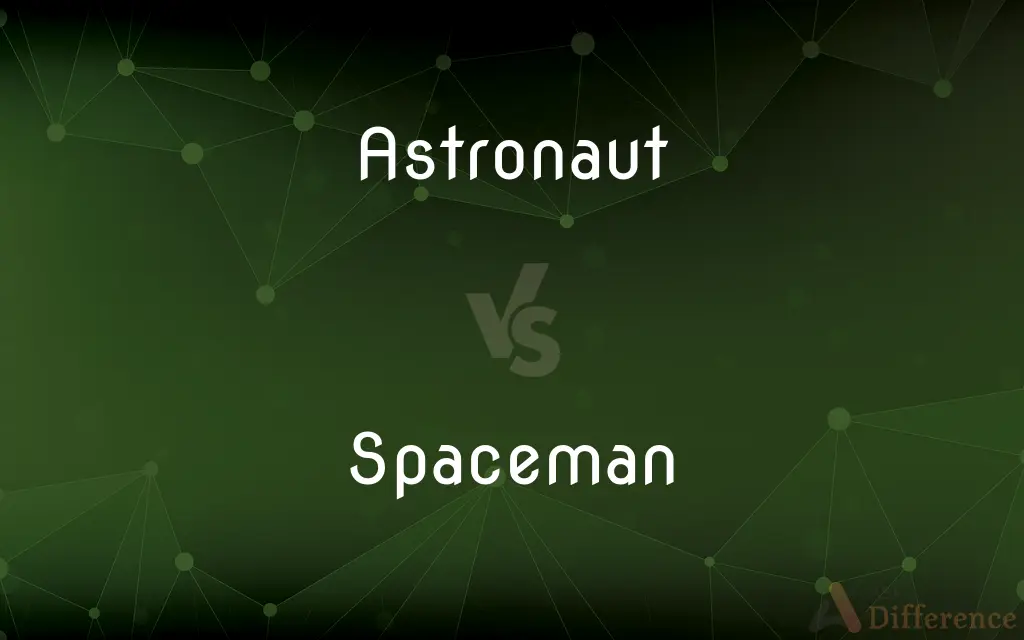Astronaut vs. Spaceman — What's the Difference?
Edited by Tayyaba Rehman — By Fiza Rafique — Updated on March 27, 2024
Astronaut refers to a trained professional who travels into space, often associated with American space missions, while spaceman is a more general, colloquial term for anyone who travels in space, without specific national affiliation.

Difference Between Astronaut and Spaceman
Table of Contents
ADVERTISEMENT
Key Differences
Astronaut is a term used specifically to describe individuals who have been trained and are part of space exploration missions, especially those organized by NASA or other international space agencies. These individuals undergo rigorous training and preparation for space travel. On the other hand, spaceman is a more generic term that can be applied to anyone who travels into space, regardless of their training or the mission's specifics. It's a term often found in popular culture and science fiction, evoking a broader and sometimes more imaginative conception of space travel.
The use of the term astronaut is often associated with professionalism and formal recognition by a space exploration organization. It implies a certain level of expertise, responsibility, and involvement in scientific missions. Whereas, spaceman, while capturing the adventure and excitement of space travel, does not necessarily imply the same level of formal training or official involvement in space missions.
In public perception, astronauts are often seen as heroes, pioneers, and scientists, emblematic of human ingenuity and the desire to explore the unknown. They represent the cutting edge of human exploration and scientific discovery. Spaceman, by contrast, carries a more universal appeal, accessible to children and adults alike who dream of space, without the stringent requirements and associations with a specific space agency.
While astronaut is a term that conveys a sense of achievement and exclusivity, being reserved for those who have actually traveled to space or are in training to do so, spaceman feels more inclusive, encompassing anyone with the ambition or fantasy of space travel. This distinction highlights the broader cultural fascination with space, beyond the technical and physical realities of space missions.
Despite these differences, both terms share the fundamental connection to space exploration and the human aspiration to reach beyond our planet. Whether through the disciplined and scientific approach of astronauts or the wide-eyed wonder of spacemen, both contribute to our collective imagination and understanding of space as the final frontier.
ADVERTISEMENT
Comparison Chart
Definition
A trained professional for space missions.
A generic term for anyone who travels in space.
Association
Specifically linked with space agencies like NASA.
Broad, colloquial, used in popular culture.
Training and Expertise
Requires rigorous training and specific expertise.
Implies no specific training or expertise.
Perception
Seen as pioneers, scientists, and heroes.
Evokes adventure, accessible to all who dream of space.
Use
Formal and specific to the profession.
Informal and general.
Compare with Definitions
Astronaut
A person trained by a human spaceflight program to command, pilot, or serve as a crew member of a spacecraft.
The astronaut shared her experiences of living on the International Space Station.
Spaceman
An informal term for an astronaut or cosmonaut.
As a child, he always dreamed of becoming a spaceman.
Astronaut
Specifically refers to space travelers from certain countries, notably the United States.
The team of astronauts prepared for their mission to Mars.
Spaceman
Does not specify training or affiliation with a space agency.
The storybook’s spaceman traveled the galaxy in his spaceship.
Astronaut
Represents the pinnacle of human space exploration efforts.
As an astronaut, she had fulfilled her lifelong dream of seeing Earth from space.
Spaceman
Can evoke a sense of adventure and exploration.
The children dressed as spacemen for their school play about the solar system.
Astronaut
Emphasizes professional training and participation in space exploration.
Becoming an astronaut requires years of training and study in science and engineering.
Spaceman
Often used in popular culture and media to refer to space travelers.
The movie featured a spaceman on a journey to discover new worlds.
Astronaut
Associated with significant achievements in space exploration.
The astronaut was honored for his contributions to space science.
Spaceman
Accessible and inspirational to a wide audience.
The exhibit on space travel inspired many to dream of becoming spacemen.
Astronaut
An astronaut (from the Greek "astron" (ἄστρον), meaning "star", and "nautes" (ναύτης), meaning "sailor") is a person trained, equipped, and deployed by a human spaceflight program to serve as a commander or crew member aboard a spacecraft. Although generally reserved for professional space travelers, the terms are sometimes applied to anyone who travels into space, including scientists, politicians, journalists and tourists."Astronaut" technically applies to all human space travelers regardless of nationality or allegiance; however, astronauts fielded by Russia or the Soviet Union are typically known instead as cosmonauts (from the Russian "kosmos" (космос), meaning "space", also borrowed from Greek) in order to distinguish them from American or otherwise NATO-oriented space travellers.
Spaceman
An astronaut.
Astronaut
A person trained to pilot, navigate, or otherwise participate as a crew member of a spacecraft.
Spaceman
An astronaut, often a male astronaut.
I want to be a spaceman when I grow up.
Astronaut
A member of the crew of a spaceship or other spacecraft that travels beyond Earth's atmosphere, or someone trained to serve that purpose.
Spaceman
An astronaut.
Astronaut
An American space traveler, when contrasted against equivalent terms from other countries such as cosmonaut, taikonaut, spationaut, and vyomanaut.
Spaceman
An intelligent creature from outer space; an extraterrestrial; - a fictional or hypothetical being, never actually observed.
Astronaut
(Hong Kong) A person (typically man) working abroad away from their family.
Spaceman
A person trained to travel in a spacecraft;
The Russians called their astronauts cosmonauts
Astronaut
A person trained to travel in a spacecraft; one who travels in a spacecraft; - called in the Soviet Union and Russia cosmonaut.
Astronaut
A person trained to travel in a spacecraft;
The Russians called their astronauts cosmonauts
Common Curiosities
What training do astronauts undergo?
Astronauts undergo extensive physical, technical, and scientific training, including simulations of spacewalks, learning to operate spacecraft, and conducting scientific research in space.
What distinguishes an astronaut from a spaceman?
An astronaut is a professionally trained space traveler affiliated with an official space agency, while spaceman is a more general, colloquial term for anyone who travels in space.
Do astronauts undergo psychological testing?
Yes, astronauts undergo extensive psychological testing and team-building exercises to ensure they can work effectively with others under the stress and isolation of space missions.
Can women be called astronauts or spacemen?
Yes, women who are trained and participate in space missions are called astronauts. "Spaceman" is gender-neutral in many contexts, though "spacewoman" or "space traveler" are also used.
How long does astronaut training take?
Astronaut training can take two years or more, involving intensive courses in spacecraft systems, spacewalking skills, Russian language (for International Space Station missions), and survival training.
Are astronauts always from the United States?
No, astronauts can come from any country with a space agency that trains individuals for space travel. The term "cosmonaut" is often used for Russian space travelers.
Who was the first astronaut?
The first astronaut was Yuri Gagarin, a Soviet cosmonaut, who orbited Earth on April 12, 1961. The term "astronaut" is more commonly used for American space travelers, with Alan Shepard being the first American astronaut to travel into space on May 5, 1961.
What kind of scientific research do astronauts do in space?
Astronauts conduct a wide range of scientific research, including experiments in microgravity, observations of Earth and outer space, medical research to understand the impact of space on the human body, and technology development for future space exploration.
How do astronauts communicate with Earth?
Astronauts communicate with mission control and their families through satellite-based systems that allow for voice communication, video calls, and data transfer, despite the vast distances.
How has the perception of astronauts and spacemen changed over time?
Initially, astronauts were seen as elite pioneers. Over time, as space travel has become more envisioned in popular culture, the term "spaceman" has broadened the public's imagination about space exploration, making the concept more accessible and widespread.
What are the physical requirements to become an astronaut?
Astronaut candidates must pass rigorous physical exams and meet specific criteria, such as height and vision requirements, to ensure they can endure the stresses of space travel and perform necessary tasks in space.
Has the term "spaceman" evolved over time?
Yes, the term "spaceman" has evolved from early science fiction to a more general term that encompasses any individual who travels in space, reflecting changing attitudes and the democratization of space exploration.
Can astronauts be from countries without space programs?
Yes, through international partnerships, such as those with NASA or Roscosmos, individuals from countries without their own space programs can become astronauts and participate in space missions.
What is the role of a spaceman in popular culture?
In popular culture, spacemen often symbolize exploration, adventure, and the human spirit's boundless curiosity. They feature in stories and films that explore themes of discovery, conflict, and the future of humanity in space.
What challenges do astronauts face when returning to Earth?
Upon returning to Earth, astronauts face physical challenges such as readjusting to Earth's gravity, which can affect their balance, coordination, and muscle strength. They also undergo debriefings and medical evaluations to monitor their health and recovery.
Share Your Discovery

Previous Comparison
Actual vs. Potential
Next Comparison
Turnover vs. ProfitAuthor Spotlight
Written by
Fiza RafiqueFiza Rafique is a skilled content writer at AskDifference.com, where she meticulously refines and enhances written pieces. Drawing from her vast editorial expertise, Fiza ensures clarity, accuracy, and precision in every article. Passionate about language, she continually seeks to elevate the quality of content for readers worldwide.
Edited by
Tayyaba RehmanTayyaba Rehman is a distinguished writer, currently serving as a primary contributor to askdifference.com. As a researcher in semantics and etymology, Tayyaba's passion for the complexity of languages and their distinctions has found a perfect home on the platform. Tayyaba delves into the intricacies of language, distinguishing between commonly confused words and phrases, thereby providing clarity for readers worldwide.
















































